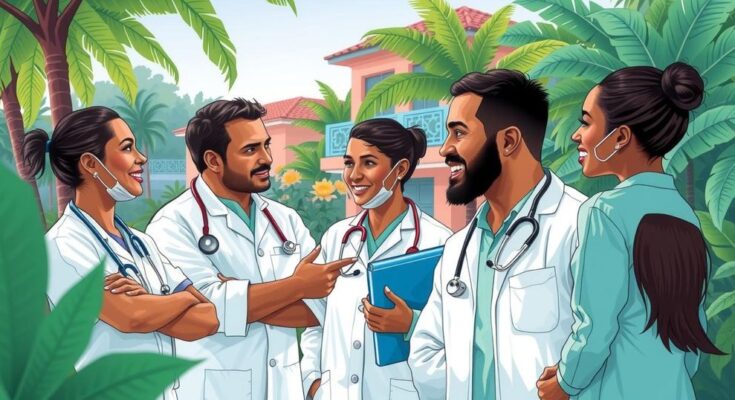Marco Rubio announced expanded U.S. visa restrictions targeting Cuba’s labor export program. Caribbean leaders have had varied reactions, with many defending Cuba’s role in their healthcare sector. Prime Ministers from several Caribbean nations vehemently rejected accusations of complicity in human trafficking related to Cuban medical personnel. CARICOM’s coordinated response remains ambiguous amid potential future actions concerning healthcare staffing.
On February 25, Marco Rubio, the United States Secretary of State, announced an expansion of visa restrictions that target efforts connected to Cuba’s labor export program, specifically regarding overseas medical missions. This policy impacts current or former Cuban officials and foreign government representatives involved in this program, including their immediate family. Rubio emphasized the detrimental effect of these labor export programs on ordinary Cubans who lack essential medical care.
In response, Caribbean leaders have remained largely silent on the matter. Jamaican Prime Minister Andrew Holness has not publicly commented on the situation, while Foreign Affairs Minister Kamina Johnson Smith expressed concern due to Jamaica’s long-standing participation in the Cuban medical cooperation program. Meanwhile, the Government of Guyana has inquired with the United States about this policy’s implications for hiring Cuban medical professionals.
Leaders from Dominica and Grenada have firmly defended their partnerships with Cuba. Prime Minister Dickon Mitchell of Grenada asserted the legitimacy of the relationship due to Cuba’s historical support in the medical field, while Prime Minister Roosevelt Skerritt of Dominica emphasized the significance of Cuban medical personnel for the Caribbean region’s health systems.
Prime Minister Gaston Browne of Antigua and Barbuda vehemently rejected accusations of human trafficking, asserting that Cuban healthcare workers are vital to their healthcare services. Trinidad and Tobago’s Prime Minister Keith Rowley echoed this sentiment while pointing out that accusing the Caribbean of exploitation misrepresents their healthcare staffing practices.
Barbados Prime Minister Mia Mottley stated the critical role Cuban medical staff played during the pandemic, asserting that their engagement does not equate to human trafficking. St. Vincent and the Grenadines Prime Minister Ralph Gonsalves highlighted the importance of Cuban medical personnel in providing essential services, questioning the validity of accusations against their engagement with Cuban professionals.
Professor Sir Hilary Beckles, Vice-Chancellor of the University of the West Indies, affirmed regional leaders’ commitment to working collaboratively with Cuba, notwithstanding external pressures. CARICOM heads discussed these concerns during a meeting post-announcement, but there has been no unified CARICOM response thus far.
In light of this ambivalence, Jamaica’s Health Minister Dr. Christopher Tufton mentioned potential plans to recruit healthcare professionals from other countries as a contingency if engagements with the U.S. do not yield favorable outcomes, reflecting uncertainty within the region regarding its reliance on Cuban medical staff.
The Caribbean community seeks clarity on CARICOM’s stance regarding the United States’ announcement, as foreign policy coordination remains one of its key mandates. A passionate statement from a Caribbean citizen on social media encapsulates public sentiment regarding the crucial contributions of Cuban medical workers to the region’s healthcare systems.
The responses from Caribbean leaders reveal a strong defense of partnerships with Cuba, dismissing accusations from the United States regarding human trafficking. While some leaders have openly supported Cuban medical workers, consensus within CARICOM remains unclear in terms of a coordinated approach. As many regional nations depend on Cuban healthcare professionals, the potential repercussions of U.S. policy pose a significant concern for the Caribbean’s health systems. Public sentiment underscores the critical value of Cuban medical assistance over external political pressures.
Original Source: www.stabroeknews.com




